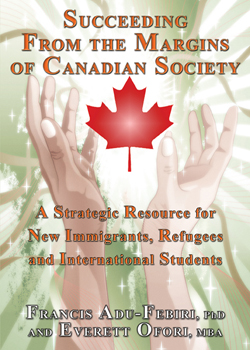Succeeding From the Margins of Canadian Society: A Strategic Resource for New Immigrants, Refugees and International Students
CCB Publishing
It is possible to overcome barriers to minority success in Canada. The stance of this book is that new immigrants, refugees and international students do not have to settle for underachievement despite the cultural and structural disadvantages they face in Canada. The fact is, the unequal social structure of Canada has some cracks, and many minorities have used strategic resources to open up these cracks and achieved tremendous upward social mobility in Canadian society from the margins. These documented minority successes in Canada in the face of systemic marginal-ization provide lessons and hope for new immigrants, refugees and international students.
The economic, political, social and cultural problems that minorities encounter in Canadian institutions, organizations, communities and from individuals over-whelm and break many of them. However, some minorities break records in the face of the frustrations they encounter. What accounts for the success of the latter group of immigrants, refugees and international students in Canada? Individual efforts and personal ambitions are not enough to explain these success stories. This book highlights strategies and support systems that facilitate minority strategic con-nections with Canadian mainstream institutions, organizations and individuals to win from the margins of society.
Although the book does not get into the theories of inequality, equity and diversity, it does acknowledge the structural and cultural barriers to minority success in Canada. That is, it does not blame individual minorities for not making it in Canada. Rather, it points to strategic resources that new immigrants, refugees and international students can use to help them overcome some of the barriers to success in Canada.
About the Authors:
Dr. Adu-Febiri is currently Sociology Professor in the Department of Social Sciences at Camosun College, British Columbia, Canada. Francis is also an Associate Member of the Faculty of Graduate Studies at the University of Victoria. He has presented and published extensively on tourism, human factor development, globalization, diversity, racialization, and ethnicity. He is the author of First Nations Students Talk Back: Voices of a Learning People. Dr. Adu-Febiri is the founder and president of Workplace Diversity Consulting Services (WDCS), and serves as the Chair of the Ethnocultural Advisory Committee of the Ministry of Children and Family Development, Victoria, British Columbia. He has been the president of the Canadian Chapter of the International Institute for Human Factor Development (IIHFD) since 2000.
Everett Ofori is the author of Prepare for Greatness: How to Make Your Success Inevitable and The Changing Japanese Woman: From Yamatonadeshiko to Yamatonadegucci. In addition to four years of volunteer service as an English teacher with the Intercultural Association of Greater Victoria (British Columbia), Everett has coached hundreds of university and high school students both in Canada and Asia on how to hone their oral and written communication skills. He holds a Master’s in Business Administration (MBA) degree from Heriot-Watt University (Scotland) and is currently working through his Doctorate program.


